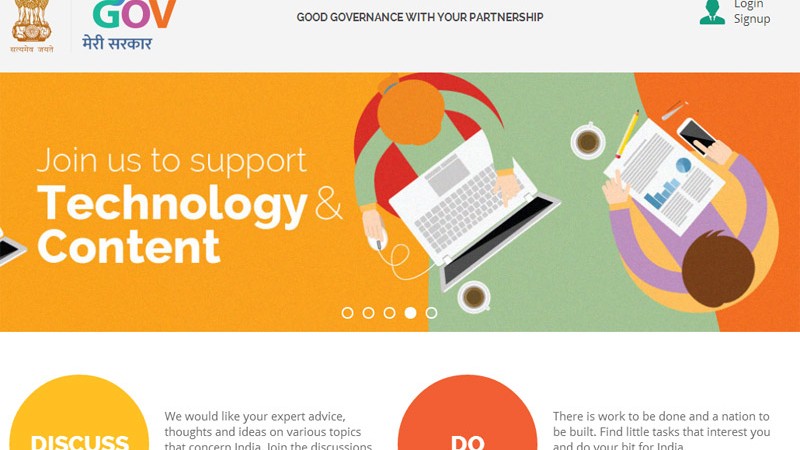There's a new website in India called “MyGov” that invites citizens to participate actively in the country's governance and development. MyGov is the work of Indian Prime Minister Narendra Modi, who's well known for his 3-D-hologram election speeches and general tech-savviness.
“We would like your expert advice, thoughts, and ideas on various topics that concern India. Join the discussions to share, debate and add value,” says the homepage. “There is work to be done and a nation to be built. Find little tasks that interest you and do your bit for India.” Indeed, India's exploding Internet-user population—currently estimated to be about 243 million people, trailing only China and the United States—is fueling the government’s efforts to tap into this latent talent pool and engage in crowd-sourcing.
The portal is meant to serve as a platform where citizens can present the government with initiatives and solutions to state problems, as part of the Modi Government's new citizen-centric push. An introductory video in Hindi and English informs first-time visitors of the site’s purpose.
MyGov currently features seven state projects: Clean Ganga, Digital India, Girl Child Education, Green India, Job Creation, Skill Development, and Swachh Bharat (Clean India). Each group hosts discussions, and anyone who signs up with the site (by surrendering their mobile number and home address) can participate. For example, the Girl Child Education group invites visitors join in an open discussion about improving schooling opportunities for young women:
With an aim to study the discussions and ideas to improve girl child education in the country, whether it be facilities or economic assistance, the ‘Girl Child Education’ group on MyGov provides the platform for the necessary debate.
The objective of this Group is to prepare a policy framework and gather suggestions that can help increase education among girl students and give them livelihood opportunities.
Groups also try to motivate the public by inventing specific tasks. The “Clean Ganga” group, for instance, challenges users to “suggest 10 actionable policy measures towards the cleaning of the Ganga.” Every task has a deadline and estimated time required for completion. As an added bonus, the government might even offer the most active users a chance to meet the Prime Minister in person.
The portal is obviously a hit with many Indians. Digital Journal reports that over 100,000 people signed up between the site’s launch on July 21 and the first week of August. The estimated traffic in July stands at 1.4 million visits. Quite likely, the prime minister's posts on Twitter, where he urged Indians to get involved, helped attract so many people.
A special Open Forum has been created on MyGov for suggestions on the new Institution. Let the ideas flow! http://t.co/zojklP70KT
— Narendra Modi (@narendramodi) August 19, 2014
The Twitter account MyGovIndia picked up over 3,000 followers in the last month alone. The account follows Modi’s lead, using social media to encourage citizen participation in India.
Join groups, accept tasks of your interest and use your skills to contribute towards Good Governance. Login to http://t.co/Subru43pey
— MyGovIndia (@mygovindia) August 22, 2014
One open-source activist tweeted:
For MyGov site of India, I demand logo design files also be acceptable in GIMP; inkscape. Text in OpenOffice. #FOSS http://t.co/uxCzeKTe5C
— Niyam Bhushan (@niyambhushan) August 27, 2014
Others lauded the government's efforts:
Excellent idea of GOI to reward 50,000 Rs for useful suggestions sent on http://t.co/FQVAFp35yK This will encourage people's participation
— Kiran Bedi (@thekiranbedi) August 1, 2014
Indeed, many Indians are extremely enthusiastic about the opportunity to help develop the country. G Siva, one blogger who signed up at MyGov, writes:
I have personally signed up for the Clean Ganga campaign. Frankly speaking, I have always complained about it and whined about how no one is doing anything to save our environment and cultural heritage. I think it is time to stop whining and start doing. I think many others are going through similar thought processes. It's a smart move for the government to tap into all this and offer a platform for concerned citizens.
Scarcely 100 days into Modi's new administration, both officials and citizens in India seem ready to welcome the citizen-centric governance model on a national scale.








2 comments
a great idea! but not everyone might have access to the internet….it can t replace that there should be talks where you have the chance to speak directly with your representatives…also on local basis
thanks for the article, it might be inspiring, hopefully also for other politicians….